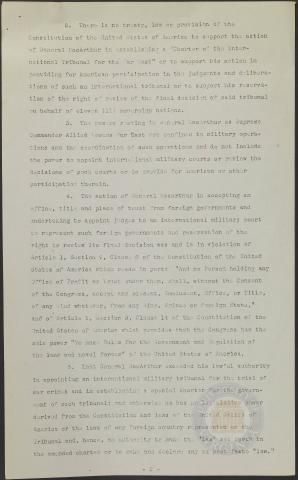
Page 2
| Parent | Motion to Dismiss on Behalf of all Defendants |
|---|---|
| Date | June 1946 |
| Language | English |
| Collection | Tavenner Papers & IMTFE Official Records |
| Box | Box 3 |
| Folder | General Reports and Memoranda from June 1946 |
| Repository | University of Virginia Law Library |
2. There is no treaty, law or provision of the Constitution of the United States of America to support the action of General MacArthur in establishing a “Charter of the International Tribunal for the Far East” or to support his action in providing for American participation in the judgments and deliberations of such an international tribunal or to support his reservation of the right of review of the final decision of said tribunal on behalf of eleven (11) sovereign nations.
3.The powers resting in General MacArthur as Supreme Commander Allied Powers Far East are confined to military operations and the coordination of such operations and do not include the power to appoint international military courts or review the decisions of such courts or to provide for American or other participation therein.
4.The action of General MacArthur in accepting an office, title and place of trust from foreign governments and undertaking to appoint judges to an international military court to represent such foreign governments and reservation of the right to review its final decision was and is in violation of Article 1, Section 9, Clause 8 of the Constitution of the United States of America which reads in part: “And no Person holding an Office of Profit or Trust under them, shall, without the Consent of the Congress, accept any present, Emolument, Office, or Title, of any kind whatever, from any King, Prince or foreign State,” and of Article 1, Section 8, Clause 14 of the Constitution of the United States of America which provides that the Congress has the sole power “To make Rules for the Government and Regulation of the land and naval forces” of t he United States of America.
5.That General MacArthur exceeded his lawful authority in appointing an international military tribunal for the trial of war crimes and in establishing a special charter for the government of such tribunal; and otherwise he has no legislative power derived from the Constitution and laws of the United States of America or the laws of any foreign country represented on the Tribunal and, hence, no authority to make the “law” set forth in the amended charter or to make and declare any ex post facto. “law.”
-2-
